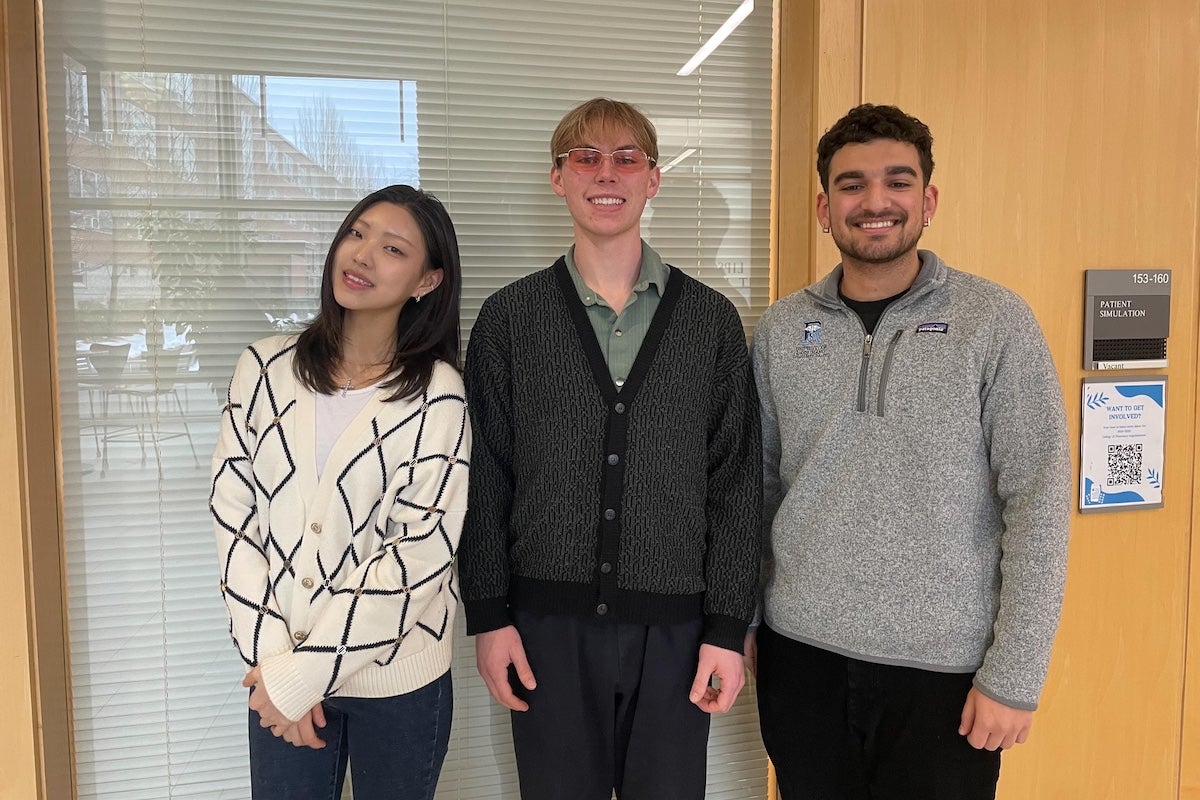After a clinical skills win in December, URI College of Pharmacy holds championships in both major national student competitions
University of Rhode Island College of Pharmacy students continue to impress at the national level, beating out 79 other colleges of pharmacy to win first place in the 2025 National Clinical Research Challenge of the American College of Clinical Pharmacy.
The latest victory comes on the heels of another major national win in the Clinical Skills Competition at the American Society of Health-System Pharmacists national conference in December, marking the first time a single school has held both championships of the nation’s top student pharmacy competitions in one academic year.
The URI team of Hailey Joo, Sami Gangji, and J.T. Berard-Moore, mentored by Clinical Associate Professor Nicole Asal, competed through three rounds, beginning with a multiple-choice exam on calcium and the effect of vitamin D on bone health. The top 40 teams advanced to round two, in which each team was presented with a case study about a person with bipolar disorder and the effects of psychiatric medications. Teams were tasked with developing a clinical pharmacy service in psychiatry/mental health, targeting at least two outcomes (e.g., clinical, humanistic), with a $50,000 budget and 2-year timeline. The URI team proposed a novel tapering protocol for selective serotonin reuptake inhibitors (SSRI, a type of antidepressant) using gradual 10 percent biweekly dose reductions, as an alternative to the more abrupt 50 percent approach.
“They had to come up with innovative solutions, making sure there’s an active role for the pharmacist to be involved,” Asal said. “The learning process is how can we develop a proposal that would actually be realistic and would mirror a real grant funding proposal.”
After a panel of judges placed the URI students in the top 20 (third overall), they moved onto the final round, which required them to expand their proposal. The URI team expanded its letter of intent into a detailed 12-page research proposal with full methodology, literature review, budget, timeline, statistical method, and IRB considerations. Proposals were judged on feasibility and innovation.
“The judges compared proposals to see which had better feasibility and acceptability with both providers and patients,” Gangji said. “Each team has to fully outline all details—all the different methods, safety parameters, statistics to analyze the study. Essentially, the main project was to outline this entire clinical trial process and essentially show this research proposal.”
As the national winner, the URI team has been invited to present its research during a poster session at the ACCP 2025 Annual Meeting in Minneapolis, this October.
“It helps demonstrate the support our college gives us, and how amazing our faculty is,” Gangji said of the win. “They push us to excel and not only be a good pharmacist, but also to get involved nationally to really show how great URI is. It was definitely a huge, collaborative effort talking out each section and thinking over every detail to make it as foolproof as possible and to make sure everything was cohesive. We’re very happy to have won. It was a lot of work, but it definitely paid off.”
True to form for future health care professionals, Joo, Gangji, and Berard-Moore are as focused on the impact the competition’s case study can have on health care as they are with their own accolades from winning.
“It’s unprecedented for us to win a challenge like this. I knew we had a good idea and we did a lot of really great work. To see the panel members and the graders were very impressed meant so much to me and my teammates, and to the university,” Berard-Moore said. “The thing that is overwhelmingly exciting about this is that they’re taking this issue of antidepressant discontinuation so seriously. We won for trying to approach this problem with a novel solution that is very innovative and extremely necessary. So to see it talked about and be given this attention means so much.”

